Fuel Injection
There are a number of diesel injection systems all of which have the same aim, to accurately deliver (in the correct amount and at the correct time) fuel to the engine.
MECHANICAL SYSTEMS
These systems are fitted with either an inline or rotary injection pump. Engine speed is controlled mechanically via throttle lever/pedal connected directly to pump or via pneumatic arrangement. The systems with inline pumps are the most reliable as the pump is very robust and can handle poor quality fuels (for a while that is). Common types/makes of inline pumps are SIMMS – CAV – LUCAS – (MINIMEC, MAJORMEC), GARDNER. BOSCH – DENSO – ZEXEL (A, P, H Types), SIGMA.
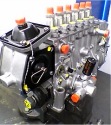 |
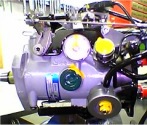 |
|
Bosch ‘P’ |
DELPHI DPCN |
ELECTRONIC INJECTION PUMPS SYSTEMS
Mechanical systems are unable to provide the low emissions required by law. To allow greater efficiency and reduced pollution electronic injection pumps where developed. These pumps are also known as ‘fly by wire’, as there is no mechanical connection from the throttle to pump. Common makes/types of electronic injection pumps are BOSCH – ZEXEL – DENSO (VP, EDC) LUCAS – DELPHI (EPIC). The electronic injection pumps are highly accurate but because of this they are sensitive to any contamination.
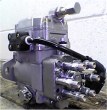 |
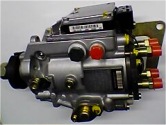 |
|
Bosch EDC |
BOSCH VP44 |
COMMON RAIL SYSTEMS
The common rail injection system does not have an injection pump but instead uses a high pressure pump, fuel rail and electronically controlled injectors. All of which rely on the ECU and a multitude of sensors. When released this system first appeared to be bullet proof but now the systems have had a few years of service this is most certainly been proven not to be the case. Due to the higher than normal working temperatures and ultra fine tolerances of the components many problems occur. This system can only operate on 100% pure diesel fuel, even petrol or the slightest amount of water will cause severe problems. Common makers of common rail systems are BOSCH, SIEMENS, DELPHI, DENSO.
 |
 |
|
Bosch Injector |
Common Rail Vital Components (Pump, Injectors and Rail, ECU) |
Common rail injectors are very often ‘cylinder coded’, this means the engine ECU is programmed with the individual characteristics of each injector. When removing common rail injectors one must remember to mark the injectors relevant to the cylinders from which they were removed and refit them into the relevant cylinders, otherwise ‘injector lockout’ may occur.
Delphi common rail injectors are particularly prone to injector lockout, infact they lockout for fun even when kept in order. Should injector lockout occur specialist diagnostic kit must be used to reprogram the injectors. DIY removal/refitting of common rail injectors is not recommended.
 |
VERY IMPORTANT NOTE: Common rail injection systems deliver over 200bar of pressure even at cranking speeds. PLEASE BE AWARE OF THIS FACT |
 |
UIS/EUI/PD SYSTEMS
Although regarded as a whole new system the actual principle of this injection system began with the American engine builders, Cummins. The Cummins PT systems was fitted to many trucks and became a legend (at that time) due to it’s reliability and economy.
UIS (unit Injection System), EUI (Electronic Unit Injection) or PDE (Pump Duse Einheit) systems are fitted to an increasing number of vehicles including Volvo FH12 trucks, LandRover TD5 and the newer 1.2/1.4/1.9/2.0 VW engines. This injection system also has no injection pump and injection pressures (up to 2000bar) are achieved via the cam shaft acting upon the pump units. Again, this system is highly sensitive to contamination and the price of replacement parts is very high. Common manufacturers of these systems are BOSCH and DELPHI.
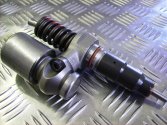 |
|
DELPHI UNIT INJECTOR (TD5) |
Here at Ribble Valley Diesels we can offer service (where possible) for any of the components used in any of the above systems


